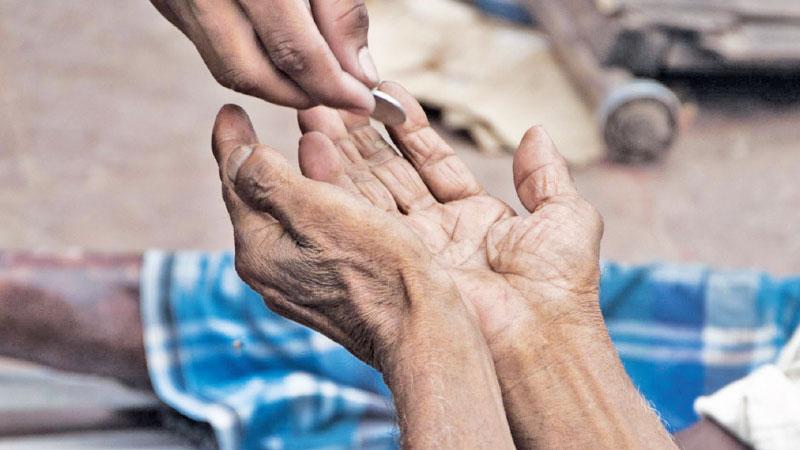
Every social problem we encounter demands a solution, but a practical solution can be arrived at only through an intelligent understanding of the nature, extent and root cause of the problem. The beggar problem is no exception to this rule. While the beggar in Sri Lanka has always been an object of charitable attention, the problem has seldom been a subject of scientific inquiry.
Of course, there have been a few local studies done, but no definite research has been conducted on the problem in its entirety and proper perspective. Conservative figures indicate that from 85,000 to 100,000 beggars are found in Sri Lanka. A recent sample study done by a research group has revealed that 79 per cent of the beggars in Sri Lanka are physically sound and free of chronic diseases. Nearly 84 per cent of them are against receiving employment while 90 per cent are against social benefits.
It is obvious therefore, begging has become a critical social problem of great magnitude. Begging has now become a profession for some, a way of life for others, and more horrific still, a lucrative racket for unscrupulous and ruthless operators, who have spawned a virtual ‘beggar mafia’, using the destitute and the helpless as commodities.
Performers
The present beggars in the country are much smarter than their previous generations. They have brought corporate professionalism into their jobs. In some of the big cities, the daily turnover from begging is millions of rupees, and the business is managed by big ‘mudalalis.’
It is easy to see these beggars performing various new and old tricks for begging in buses, busy markets, parks and around public places. Some of the beggars are so intelligent that they use all kinds of psychological and emotional tricks to make people feel sympathetic towards them. It is said, an average beggar earns around rupees 800 - 1,000 per day while some expert ‘professionals’ fetch three or four times this income.
Panhandling
The American word, ‘panhandle’, means ‘beg by accosting people on the street, asking for money.’ There is also ‘aggressive panhandling,’ which takes a more severe form. In the USA, aggressive panhandling generally involves the solicitation of donations in an intimidating or intrusive manner.
Examples may include, extending the head and both arms, or even the hand, into a car window to solicit approaching individuals from behind, as they exit their vehicles, refusing to take ‘No’ for an answer or following an individual, near super markets, banks etc. Hence, it is obvious that what we find in major cities most of the time is aggressive panhandling.
Due to these reasons, in many of the advanced countries in the world begging in public is restricted. In larger cities in the USA, panhandling has been banned. In the UK, begging is illegal under the Vagrancy Act. In Japan begging is illegal under Article 1, 22 of the Minor Offence Law.
Meanwhile, Tourist Agencies maintain that the problem of beggars is having a negative impact on the industry. From the standpoint of the tourist, encounters with beggars disrupt the habitual way of being a tourist and are viewed as an assault on the tourists’ expectations of peaceful and uninterrupted sightseeing. Therefore, this topic needs to be examined in depth in the context of tourism.
Solution
Begging can be practically eliminated or at least controlled to a great extent if there is a genuine commitment and determination to do so. The Government must stop the farce and act to bring about real change. The important steps would be, creating awareness among the public, building necessary infrastructure, and appreciating the links between poverty, unemployment, disabilities, destitution and beggary, and devising suitable solutions.
Distinguish destitution from professional beggary
The present system makes no effort to distinguish destitution from beggary. A few of the beggars are old-aged and some physically disabled. We should have sympathy for people hit by bad circumstances, but zero tolerance for begging in public. A welfare system should be adopted to accommodate them.
But professional money-makers through begging should be subjected to correctional sentences by the courts.
The public and the government must think seriously about methods of providing relief to the abandoned, old aged citizens, who lack any social security. The approach of the system should be supportive and corrective. It should be sympathetic to the whole issue of destitution and must alleviate the condition of citizens slipping into destitution.
There should be a social ‘safety net’ to provide relief and rehabilitation to sections of society or individuals struck by misfortune, calamities, handicaps, disabilities or familial, social or economic trauma.
The government along with civil society has to take comprehensive steps to provide these strata the basic amenities and alternative life support systems so that they could be discouraged from begging and have their share of the economic development of the country.
Eliminate escape avenues
Offenders who have made begging a profession have to be corrected by making them work. Simply putting them in corrective centres would have no impact. Innovative ways, such as, employing them in the maintenance of gardens, roads, and upkeep of civic amenities, would be helpful.
Educate citizens
Citizens must understand that giving some money to people who beg on the street is not a benign act. It could have fatal consequences.
We need better support services for the needy and the homeless, not just for those visible on the streets. Charitable organizations believe, a better way of providing support to the needy and the homeless is by making a donation to a reputed charity or volunteering organisation.
Although most people would not like to accept it, one cause for the pathetic situation of beggary lies with us. We encourage beggary by giving out money even when we know they do not deserve it.
